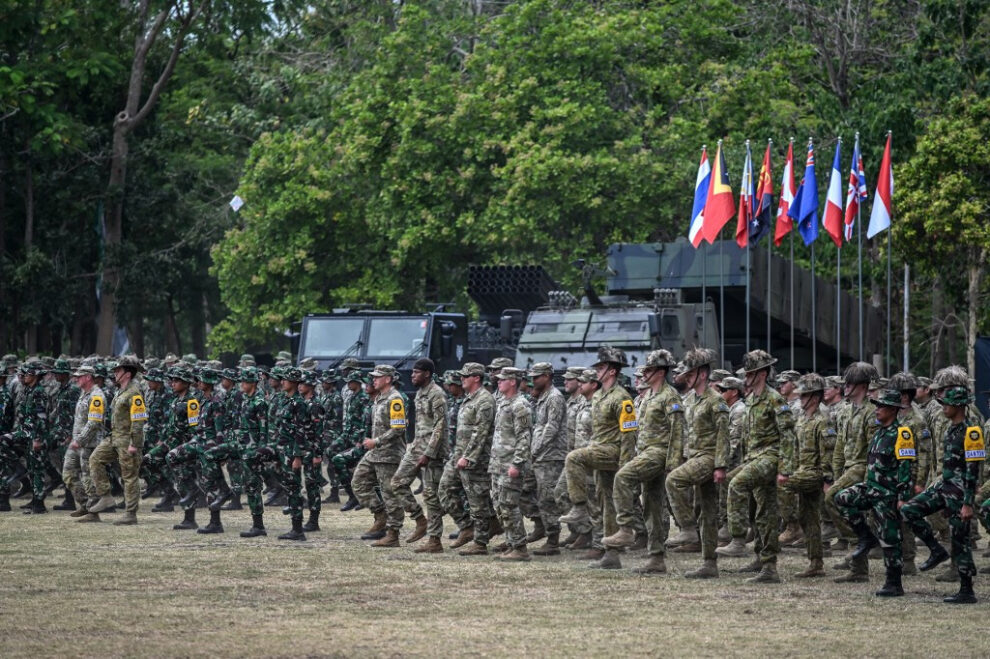Indonesia is hosting its largest annual joint military drills with the United States, Australia and other countries as tension escalates in Southeast Asia following China’s latest map of the South China Sea.
The 2023 Super Garuda Shield, which was kicked off on Thursday, will run for two weeks in East Java and convene more than 5,000 Indonesian and US troops, and 1,000 more from Australia, Japan and Singapore as well as new participants France and the United Kingdom. Another 12 nations will send observers. “This will be the largest. We can learn tactical methods of operation so that our soldiers become more professional,” Indonesian Military spokesperson Rear Adm. Julius Widjojono told BenarNews.
He said the exercises, which will run through Sept. 13 in Surabaya and Banyuwangi, aim to enhance the country’s army capabilities and strengthen regional security and cooperation. This year’s iteration of Super Garuda Shield will involve about 2,000 more troops than last year’s exercise, which had been the largest ever. The drills will include academic exchanges and professional development workshops, a command-and-control simulation, an amphibious exercise, airborne operations, an airfield seizure exercise and a combined joint field training that will culminate with a live-fire event, according to the US Embassy in Jakarta. “This joint, multinational training exercise displays our collective commitment and like-minded unity, allowing for a stable, secure, and more peaceful, free and open Indo-Pacific,” Gen. Charles Flynn, commanding general of US Army Pacific, said in the statement from the embassy.
The multi-nation drills will be taking place against the backdrop of tensions between the US and rival superpower China over Taiwan and the disputed South China Sea.
While China claims nearly all of the strategic waterway, the Philippines, Brunei, Malaysia, Taiwan and Vietnam have rejected the territorial claim. The tension among the countries has been escalated since China issued on Monday a territorial map that has claimed a larger part of the sea.
Indonesia is not a claimant, but tensions have arisen between Jakarta and Beijing over fishing rights around the Natuna Islands. Jakarta has expressed concern over Beijing’s expansive maritime claims that overlap with its exclusive economic zone (EEZ).
Indonesia’s Foreign Minister Retno LP Marsudi said that any territorial claims made by a country must be aligned with international law. The country’s stance on adherence to international law, Retno said, would continue to be a consistent feature of its foreign policy.
“Any lines drawn and any claims made must be in line with the UNCLOS,” the minister told reporters on Thursday. “This isn’t a new position”.
Earlier this week, a Chinese foreign ministry spokesman called on the US to stop meddling in the region. He was responding to a reporter’s question about an apparent joint statement from Indonesian and US officials regarding Beijing’s South China Sea claims. Spokesman Wang Wenbin said the Indonesian officials had denied making the statement.
“Countries in the region share common aspirations and interests to maintain peace and stability in the South China Sea and work together for development,” Wang said on Monday.
“The US needs to earnestly respect regional countries’ effort to uphold peace and stability in the South China Sea, stop meddling in South China Sea issues, stop sowing discords and creating trouble and refrain from disrupting peace and stability in the region,” he said.
The latest map issued by China adds portions of Malaysian waters near Sabah and Sarawak, as well as disputed regions in India, Taiwan and the South China Sea to territory that Beijing claims. The map also covers maritime areas within the exclusive economic zones of Brunei, the Philippines, Indonesia and Vietnam.
The map, published on China’s Ministry of Natural Resources, has been rejected by the Philippines, Taiwan and Vietnam, and prompted diplomatic protests from India and Malaysia.
Fitriani, a researcher at the International Institute for Strategic Studies, a think-tank in Singapore, said the increase in troops indicated the importance of defense cooperation for the region, especially in the face of rising geopolitical tensions.
“The joint exercise is also a show of force by INDOPACOM, which is the US military command for the region, to China, besides improving cooperation, readiness and interoperability among the countries involved,” she said.
Source : The Jakarta Post










